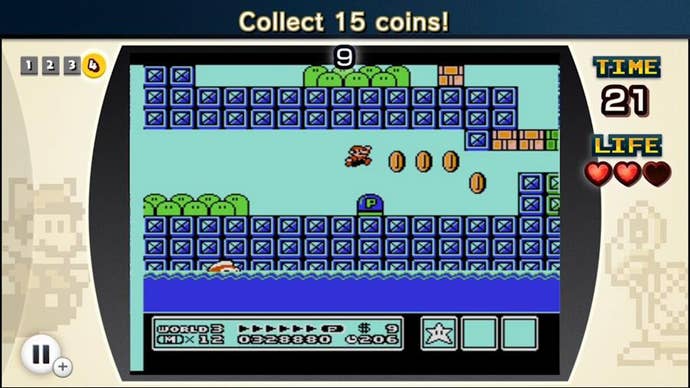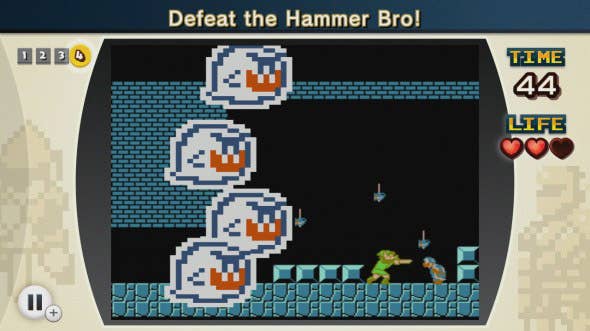NES Remix 2 Wii U Review: Sometimes, Less is More
Nintendo's second 8-bit mini game collection proves that even a great idea is only as good as its content.
This article first appeared on USgamer, a partner publication of VG247. Some content, such as this article, has been migrated to VG247 for posterity after USgamer's closure - but it has not been edited or further vetted by the VG247 team.
After Nintendo's surprise release of NES Remix late last year, the most common complaint about the game went something along the lines of: "This is great... but if only it were based on better games!" Entertaining as it was to wander through a mash-up of early Nintendo games, wouldn't a remix of later, better games be more fun?
Well, as it turns out: No, actually, it wouldn't. I'm sorry, everyone, but you were terribly mistaken.
Don't get me wrong. NES Remix 2 is hardly terrible. But in shifting its focus to latter-day NES games – Super Mario Bros. 3, Kirby's Adventure, Zelda II, that sort of thing – it loses the purity of purpose that made its predecessor so compelling.
The core concept remains addictive as ever. Nearly a dozen NES classics have been broken into micro-game tasks of increasing complexity, beginning with basic tasks like jumping or shooting and eventually pitting you against entire game stages or final bosses.

Having played most of these games through in their original incarnations, I find something fascinating about seeing iconic challenges broken into clinical, antiseptic tasks. I spent months trying to reach the end of Metroid and Zelda II; now you're timed in seconds as you attempt beat their final bosses in discrete minigames. Still, like the first NES Remix, the sequel doesn't simply rely on nostalgia for its appeal. Underneath it all, these are great games.
The problem is, they're a little too great. Few would argue that Super Mario Bros. 3 isn't better than the original Super Mario Bros., and even the deadwood selections in this collection – Wario's Woods and Dr. Mario – are a far sight better than previous clutter like Urban Champion. But those games' excellence came from the increased complexity of their design, and their mechanics don't break down into digestible chunks as easily as the early arcade-style titles compiled in the first NES Remix. Where the previous remix felt like a legitimate bunch of minigames, this one lacks that punchy compactness.
The previous Remix felt almost like a training mode, teaching you to play each game in succession, but that sensation vanishes here... especially when the first challenge of several games is to sit and watch a passive game demo or tutorial for a minute or longer. The charm of Nintendo's games, and NES Remix, is that they so often manage to convey their rules without such kludges. The sequel seems to have lost sight of that fact, and it suffers for the oversight. Overall, the challenges vary far more in length, and some of them drag terribly. The same material worked perfectly in the context of the original NES games, but broken out and isolated like this, it can feel awkward — out of place.
So, while I'd much rather spend a few hours playing Super Mario Bros. 2 than Balloon Fight, Balloon Fight works much better in 10-second bursts than Super Mario Bros. 2. Not surprisingly, these odd snippets of game prove to be far more entertaining in the unlockable "remix" stages, which smash together elements of different NES games in interesting ways. Some of the remixes feel disappointingly mundane, such as the Metroid stage that simply consists of descending one of those infamously lengthy vertical shafts in Morphing Ball form without taking damage. On the other hand, you have things like Toad from Super Mario Bros. 2 fighting through a Zelda II dungeon, or Kirby attempting to beat that stupid recurring tree boss while fending off a wall of encroaching Boos. Sure, there are plenty of Flash games that have shuffled NES games around, but once again brevity pays off: These remixes are short enough to be intriguing, offering small enough doses that the novelty never wears thin.

The greatest feature of NES Remix 2, though, comes in the form of its extras. Anyone who owns the first game can play a special "Championship Mode," which seems to be a riff on the NES World Championship challenge from the early '90s. The titles are different here – Super Mario Bros. 3 and Dr. Mario replacing Tetris and Rad Racer – but the goals (collecting coins, beating scores) and the scoring methodology (with the third title being most heavily weighted) feel like definite callbacks. The heavy emphasis on Mario feels like a bit of a missed opportunity, but on the other hand Championship Mode will include a leaderboard once Miiverse support for NES Remix 2 is up and running, something that's bizarrely uncommon in Nintendo products.
Even more intriguingly, NES Remix 2 features a second bonus game called Super Luigi Bros. This is basically just Super Mario Bros., but with two significant differences. First, you play as Luigi, who sports his standard exaggerated jump physics. Secondly, the entire game has been mirrored horizontally, so every stage runs from right to left. The liberating effect of the high jump physics – you can reach so many new places and take so many alternate routes! – is negated by the intense weirdness of playing the familiar levels of Super Mario Bros. in reverse. It might not seem that big a deal, but muscle memory is a hell of a thing. I suspect players who barely know the original game won't find the flipped version especially vexing, but for those of us who have been playing Mario for nearly 30 years, Super Luigi Bros. might be the most challenging task in this entire package.
I honestly am surprised that I didn't enjoy NES Remix 2 as much as its predecessor, but I suppose it makes sense. In the end, the whole thing feels like a spinoff of 9-Volt's stages in WarioWare Inc., a game built entirely around five-second fragments of other games. By and large, the titles and challenges that comprise NES Remix 2 simply don't lend themselves to that sort of processed repackaging. The end result is fun, but the first NES Remix is definitely the one to play.
The Breakdown:
- Graphics: Totally dated, but that's the entire point.
- Audio: See also: "Graphics."
- Interface: Straightforward enough. Though, after playing through hundreds of these minigame events, the overly lengthy ranking displays after each round really start to drag.
- Lasting Appeal: Clearing the events will keep you busy for a few hours. Unlocking stamps and earning top rankings, if that's you thing, will keep you going much longer. And depending on how mind-bending you find Super Luigi Bros., you could be smashing your brain against it for years.
ConclusionThe fundamental premise of NES Remix 2 remains sound, but the shift in focus to more complex source material crimps its style somewhat. Thankfully, the bonus modes go a long way toward restoring some of the shine to its star. It's not quite as essential a play as its predecessor, but it offers an amusing, self-referential distraction nevertheless.
